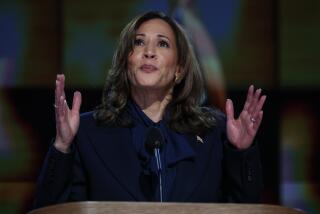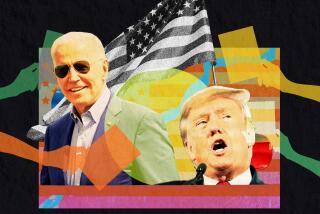COLUMN ONE : America’s Vanishing Majority : The militant middle, inspired by Perot, may have fractured the two-party system. For Clinton and Congress, it’s tougher to piece together a winning margin.
WASHINGTON — Seven months after President Clinton won office with one of the smallest pluralities in this century, the American electorate remains extraordinarily fractured and fractious. The two party coalitions that monopolized politics for the last 60 years have unraveled, but no new majority has arisen to replace them.
Instead, American politics resembles a complex game of three-dimensional chess in which Democrats and Republicans compete not only with each other but with a new, militant center rallied by--although not necessarily beholden to--Ross Perot.
According to an extensive Los Angeles Times Poll conducted earlier this month, neither Clinton, the GOP nor Perot comes close to attracting support from a majority of Americans.
“The 1992 election was a shattering election, but not necessarily a realigning one,” says Stanley B. Greenberg, Clinton’s pollster. “The public is extremely rootless now . . . I don’t think we’ve seen a period like this.”
This instability in public opinion is the foundation for much of the recent political turmoil in Congress. Without a public mandate, Clinton has found it virtually impossible to cement a stable majority on Capitol Hill, even though his own party controls both chambers. On many issues--particularly taxes, spending and the role of government--Clinton has been unable to strike a balance that satisfies hard-core Democratic partisans while still reaching out to moderates, both in the country and Congress.
Without a coalition that can reach 50%, “it’s just hard to put together the votes for anything big,” laments Clinton adviser George Stephanopoulos.
Throughout recent history, presidents have similarly struggled with the opposition party for the loyalty of swing voters, both in the country and the Congress. But now both Clinton and the GOP face a new complication. With Perot providing a focus for millions of Americans who self-consciously choose not to identify with either the Democrats or the Republicans, the nation may be in for an unusual period in which both parties find themselves losing ground at once.
One of Clinton’s strongest arguments as a candidate was that his “third way” agenda would build a new majority of progressives in both parties. Instead, in office, a combination of his own mistakes, the relentless opposition of Perot and the GOP, and the inherent tensions of a three-way struggle have produced an extraordinary degree of political polarization.
Clinton’s public approval rating has dropped faster than any President in modern times. In Congress, voting in the first few months of Clinton’s Administration has been substantially more polarized by party than any time since 1946, according to Congressional Quarterly.
Clinton aides, and some Republican strategists, believe the President may yet be able to forge a new majority if he can improve the economy and set a course that attracts greater support from moderate Republicans and conservative Democrats. If he cannot construct such a majority, many analysts believe the trend toward three-way polarization will accelerate--fundamentally undermining the two-party system.
*
In the competition to build a majority, the Democrats do hold a substantial head start. Clinton drew the largest response among those asked by The Times Poll to place themselves in a group of “people who basically support” the President or “supporters of the Republican Party” or those who “think that Ross Perot offers the best ideas” or none of the above.
In the poll, Clinton attracted 37% of those surveyed, the Republicans 19%, Perot 16% and unaffiliated 26%. Among those Americans who say they are registered to vote, the margins were virtually the same--Clinton 38%, Republicans 22%, Perot followers 15% and unaffiliated 23%.
The poll, supervised by Los Angeles Times Poll director John Brennan, was conducted June 12 through 14 and surveyed 1,474 adult Americans. The results have a margin of error of plus or minus 3 percentage points.
The Republican part of the question refers to a party rather than an individual. That may have held down the response slightly, although it reflects the fact that the GOP has no single, nationally recognized leader.
But while the Clinton supporters have the largest share, Clinton and his advisers have painfully learned that having the biggest plurality falls far short of what a President needs to govern. And hopes of gaining a working majority are diminished by the fact that some of the views held by Clinton backers--particularly on the usefulness of government--sharply separate them from the rest of the electorate.
Of course, American government has always had to contend with shifting coalitions and comparatively weak parties. But for most of the years since the Great Depression, the battles over national policy have largely been fought within the framework of the two-party system.
First the Democrats, from Franklin D. Roosevelt through the mid-1960s, and the Republicans, from Richard Nixon through Ronald Reagan, constructed coalitions that allowed them to regularly win the presidency and shape national policy.
Third-party movements, although they erupted periodically, rarely survived long enough to affect the balance. Perot’s supporters are defying that pattern in part because Perot has the funds to keep himself so visible through television appearances. In addition, his supporters’ fundamentally anti-Establishment attitudes make them difficult for either party to assimilate.
Perot is also riding a much larger wave of public discontent with Washington and the established parties that may not have crested. Increasingly, “people are refusing to identify with either party,” says Republican pollster Bill McInturff.
Other analysts do not go as far as McInturff, who believes the number of independent voters has grown dramatically in the past decade. But nearly all agree that the nature of “independence” has changed.
In the past, most so-called “independents” more accurately could be described as disengaged--relatively less likely than other Americans to register or vote, relatively uninterested in public affairs and prone to pay little attention to government or politics.
That group still exists. The 26% who called themselves unaffiliated in the poll are a fairly amorphous amalgamation who, in comparison with other Americans, tend to have less education and are less likely to be registered to vote.
But Perot has drawn millions into a new militant independence, pulling roughly equally from both major parties, Times Poll director Brennan says.
“With Perot becoming part of a permanent opposition . . . I think they will be a more cohesive force,” says Martin Wattenberg, a political scientist at UC Irvine who has written extensively on the decline of the major parties. “They needed a mobilizing force, and here is a guy who through appearances on television can really sway their opinions.”
For years, political scientists have argued that the two major parties were non-ideological groupings that overlapped more than they differed. But now three polarized coalitions--people who identity themselves with either Clinton, the Republicans or Perot--dominate the political landscape.
The members of the Clinton and Republican coalitions are mirror images--opposites on ethnicity, religion, occupation and perhaps most important, fundamental beliefs about government and society.
And while Democrats and Republicans group themselves at opposite ends of a single axis in defining these beliefs, the Perot group is defined by a completely different set of concerns.
Nearly one-third of the Clinton coalition is made up of blacks, Latinos and other minorities. The Republican coalition is 92% Anglo, with small numbers of Latinos. Jews, union members and liberals all tend strongly to be Clinton backers; the Republican coalition generally includes none of these groups.
Three-fourths of Republicans are married while almost 4 in 10 Clinton supporters are single. Among whites, Republicans are more likely than Clinton supporters to describe religion as very important in their lives and the Bible as the literal word of God.
Members of the Clinton coalition widely support the idea that government should help business create jobs and compete productively. The Republicans believe government should leave the economy to the private sector. Clinton people say the nation’s bigger problem comes from rich people not paying their fair share, the Republicans say it’s that poor people receive undeserved welfare benefits.
Clinton supporters tend strongly to agree with his decision to allow gays to serve in the military. Republicans are strongly opposed.
Clinton backers, by 50% to 32%, pointed to the bad economy as the greater threat to American families, while Republicans chose a poor moral climate, 62% to 25%.
By contrast, no single issue--not even the deficit--defines the Perot group, a sharp difference from most recent third-force movements. Instead of ideology, they are defined by attitudes--lack of trust in government, pessimism about the future, and economic nationalism, seen in their strong opposition to the proposed North American Free Trade Agreement.
Perot’s supporters find themselves on both sides of the culture wars that divide Republicans from Clinton’s backers--generally favoring abortion rights but opposing gays in the military, for example. But those cultural issues define them far less than economic matters.
They are, notes Democratic pollster Celinda Lake, generally suspicious of authority, whether big government, big business or churches.
Not even support of Perot himself really defines the group. Nearly a fifth of them do not express confidence that Perot “has the kind of stable temperament a President needs,” and 45% say a Perot endorsement of a candidate for governor or Congress would have “no effect” on how they would vote. While some are die-hard Perot followers, many others view him more as a symbolic rallying point.
“Most of them are actually followers of the message, not the man,” says Republican pollster Frank Luntz, who worked for Perot’s campaign. “But no one delivers the message the way he does.”
One demographic factor that does heavily shape the Perot coalition is gender. While the GOP coalition is almost evenly split and Clinton supporters include substantially more women--58% to 42%--the Perot coalition is male by a large margin, 61% to 39%.
And not just any men. Perot draws support from several demographic groups, but his primary base is made up of blue-collar white men in their 30s and 40s, precisely the group that, since it entered the labor force, has seen its relative position in the economy and society pummeled by two decades of stagnant wages, industrial layoffs, and increased competition for jobs and promotions from women and minorities.
“They are people who came of age during Watergate and Vietnam,” says Luntz. “They don’t remember the Great Society or the advances against segregation” and have little experience with any government program that has worked.
All of that helps account for one of the most striking characteristics of the Perot group: their extremely high levels of pessimism.
Asked to predict whether the next generation of Americans will have a higher or lower standard of living than the current generation, 67% of the Perot group say they believe things will get worse, a view shared by 55% of the Republican supporters and 39% of the Clinton group.
Similarly, 33% of Perot backers say the nation’s economy is in serious recession, compared with 10% of Republican and 26% of Clinton supporters. More than a third of Perot supporters expect unemployment to worsen in the next three months as compared with roughly one-fifth of either the GOP or Clinton groups.
Along with that pessimism goes a deeply ambivalent view of government. Like Clinton’s supporters, Perot’s followers tend to believe government has a major role to play in society, but like the Republican group, they believe the government is hugely wasteful, irresponsible and incompetent.
Slightly over half of both Clinton and Perot supporters favor an activist government that “has an obligation to help people when they are in trouble,” according to the Times Poll. By contrast, only 26% of the Republican group took that view, with 68% siding with the sentiment that people had the obligation “to take care of themselves.”
At the same time, however, nearly one-third of Perot supporters said they believe the government wastes more than 75 cents of every dollar it spends, and more than half said they believe waste amounts to over half of all government spending.
That split verdict on government helps explain why both major parties have found such difficulty forging a majority either in Congress or in the country at large.
For Republicans, citizens’ memory of years of slow economic growth under their stewardship and the image of a party that cares more about the affluent than the average American could prove an insuperable burden. By an overwhelming margin, for example, Perot supporters (57% to 21%) join Clinton supporters (75% to 6%) in blaming the nation’s economic problems on Presidents Reagan and Bush rather than on Clinton or the Democratic Congress.
But Clinton and his followers face an equally tough challenge. For theirs is the party that believes in the efficacy of government. And it is precisely that belief that Perot’s supporters--along with millions of other white, middle-class Americans--have abandoned. To rebuild his own majority, Clinton now must convince those angry voters that government can offer them something more than a higher tax bill.
How the Poll Was Conducted
The Times Poll interviewed 1,474 adults nationwide by telephone June 12-14. Telephone numbers were chosen from a list of all exchanges in the country. Random-digit dialing techniques were used to ensure that listed and unlisted numbers could be contacted. Results were weighted slightly to conform with census figures for sex, race, age, education and household size. The margin of error for the total sample is plus or minus 3 percentage points. For certain subgroups, the error margin is somewhat higher. Poll results can also be affected by other factors, such as question wording and the order in which questions are presented.
Search for Majority
First in a series on the three-way competition among President Clinton, the Republican Party and Ross Perot to build a majority coalition in American politics
* PART ONE: An examination of the differing priorities and attitudes of the three major blocks in the electorate
* PART TWO: A look at the key issue dividing Americans: What is government’s role in society and the economy?
* PART THREE: How President Clinton’s efforts to build a legislative majority on Capitol Hill have exacerbated--and been complicated by--his lack of majority support in the country.
A Fractured Political Landscape
The following chart illustrates how Clinton, Republican and Perot supporters, as well as Americans who support no group, differ on some major ideological, cultural and economic issues.
* If you had to choose, which group would you place yourself in right now: a Bill Clinton supporter, a Republican supporter, a Ross Perot supporter or a supporter of none of these? Clinton: 37% Republicans: 19% Perot: 16% None: 26% Don’t know: 2% *
Do you think the next generation of Americans will have a better standard of living, a worse standard of living or about the same that we have now?
Total Clinton Republican Perot Support sample supporters supporters supporters none Better 14% 22% 7% 9% 8% Worse 51% 39% 55% 67% 59% Same 32% 36% 33% 23% 29%
*
Out of every dollar the federal government spends, how many cents do you think are wasted?
Total Clinton Republican Perot Support sample supporters supporters supporters none 1-25 12% 20% 8% 5% 8% 26-50 36% 37% 38% 35% 36% 51-75 19% 15% 21% 20% 20% More than 75 20% 13% 22% 31% 24% Nothing 1% Don’t know 13% 14% 11% 9% 12%
*
Do you approve or disapprove of allowing homosexual men and women to serve in the armed forces of the United States?
Total Clinton Republican Perot Support sample supporters supporters supporters none Approve strongly 23% 40% 5% 15% 15% Approve somewhat 18% 19% 13% 16% 22% Disapprove somewhat 9% 9% 11% 7% 9% Disapprove strongly 43% 28% 68% 51% 43% Don’t know 7% 4% 3% 11% 11%
*
What’s the bigger problem for this country right now:
Total Clinton Republican Perot sample supporters supporters supporters The rich not paying their 31% 39% 16% 25% fair share of taxes People on welfare getting 31% 20% 48% 39% undeserved benefits Neither 2% 3% 4% 1% Both 33% 35% 29% 34%
Support none The rich not paying their 35% fair share of taxes People on welfare getting 29% undeserved benefits Neither Both 33%
Note: Numbers do not add up to 100% because some “don’t know” categories are not shown.
SOURCE: Los Angeles Times Poll
More to Read
Get the L.A. Times Politics newsletter
Deeply reported insights into legislation, politics and policy from Sacramento, Washington and beyond. In your inbox three times per week.
You may occasionally receive promotional content from the Los Angeles Times.











